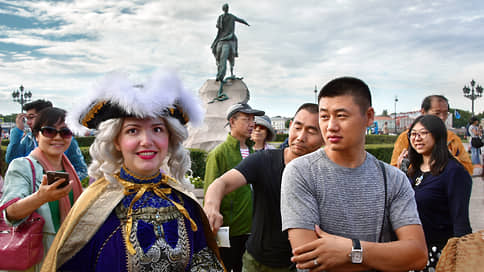China and Africa were added to the army and navy – Newspaper Kommersant No. 50 (7495) of 03/24/2023
[ad_1]

On Thursday, the Expert Institute for Social Research (EISI) held a round table, the participants of which undertook to prove that Russia is not in international isolation. This conclusion, in their opinion, is confirmed not only by the visit to Moscow of Chinese President Xi Jinping, but also by the Russia-Africa inter-parliamentary conference. True, the current generation of Russians is still more oriented towards the West, experts admitted, but the inevitable “pivot to the East” will be facilitated by citizens who left there in connection with partial mobilization.
The round table “Russia in a Multipolar World: Common Values and Mutual Trust” was timed to coincide with the end of Chinese President Xi Jinping’s visit to Moscow. But the moderator of the event, political scientist Alexander Asafov, suggested adding the recent Russia-Africa inter-parliamentary conference to the discussion. “Why do I put these two events in one row? The fact is that the Western information space is broadcasting to us the thesis of the partial or almost complete isolation of Russia,” Mr. Asafov set the tone for the discussion. In his opinion, these two events prove that there is no need to talk about any isolation of Russia. Although the West continues to insist on the “economic, political, ideological, media” isolation of Russia because it violates certain “rules”.
Gleb Kuznetsov, head of the EISI Expert Council, volunteered to clarify and largely debunk these “rules”. The term “rules-based order” replaced the term “liberal international order” in the 90s, then was forgotten, but received a new life in the mid-2010s, the expert said. His resurrection was facilitated by China, which was blamed by its opponents for the genocide of Uyghur Muslims. “It is with ‘rule based order’ that the US justifies its interventions since the second Iraq war. It is very easy to explain what you are doing by the fact that your opponents violate some rules, if these rules are not fixed in any way, if they actually do not exist, ”Mr. Kuznetsov outlined the deep essence of the current situation.
Other experts have moved on to specifics, trying to compile a list of countries that may not like the mentioned “rules”. Thus, Andrei Ostrovsky, professor at the Department of Modern and Contemporary History of Asian and African Countries at Moscow State Pedagogical University, compared Xi Jinping’s visit to Russia with Mao Zedong’s visit to the USSR: “Now the West has discovered that Russia is not isolated, that it has an ally whose economy is much higher than the US.” “The countries of Africa are indignant at the isolation of Russia. They perceive it as attacks against themselves too, it causes rejection, ”Andrei Maslov, director of the Center for African Studies at the Higher School of Economics, added to Moscow at once fifty allies, at the same time promising that the Black Continent will be the center of economic growth for the next ten years. “The visit of Xi Jinping shows that the Anglo-Saxons have actually lost the economic war and are losing the ideological one,” political analyst Marat Bashirov supported the optimistic mood.
At the end of the round table, a Kommersant correspondent asked experts whether it is possible for Russia to reorient itself towards China, if the Russians themselves are still more oriented towards Western values and lifestyle, and they prefer to spend their holidays in Europe. “From the point of view of the common, united, we have a common history. If you want to know something about the history of China, take a look at the textbook on the history of the CPSU,” Andrey Ostrovsky answered like a professor. And he connected the lesser interest of Russians in China with the fact that Chinese is more difficult to learn than English.
“As far as our generation is concerned, we are hopeless. We will watch Western films, read Western books, be interested in Western philosophy,” political scientist Boris Mezhuev admitted self-critically. But he immediately added, referring to his children, that young people have at least an interest in Korean cinema and music. And Marat Bashirov, in turn, recalled that residents of Siberia and the Far East go on vacation just to Southeast Asia, and interest in the culture of some countries arises precisely when people visit them more often out of convenience and for economic reasons . In addition, Russia’s ties with the Asian region will also grow due to the fact that many Russians went there, “running away from the last wave of mobilization,” the political scientist added.
[ad_2]
Source link








